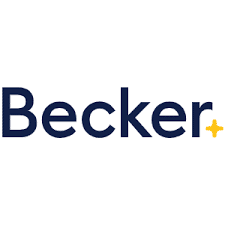
There always tends to be a lot of confusion between a CPA certificate vs license. They both mean completely different things. Furthermore, they give you different amounts of legal authority and responsibility although they seem like the same thing.
A CPA certificate, in most cases, is simply an acknowledgment. It means that you passed the CPA examination and fulfilled the minimum requirements to take it. A CPA license, on the other hand, is issued when you complete all the requirements from a board of accountancy to become a CPA. Consequently, you are granted permission by the state to practice public accounting.
Let’s take a look at some of the differences between these two designations and why you would want one over the other.
- 1.Becker CPA Review Course: Rated the #1 Best CPA Review Course of 2025
- 2.Surgent CPA Prep Course: Best Technology
- 3.Gleim CPA Review Course: Largest Question Bank
CPA Certificate vs CPA License
What’s the Different between a CPA Certificate vs CPA License?
Let’s look at a few key differences between a license and certificate.
What’s a CPA Certificate?
- No work experience requirements
- No continuing education requirements
- Cannot sign tax returns, audit reports, or use the title CPA on any official or legal report
- Cannot be an owner or partner of a public accounting firm
- Some states allow you to use the designation CPA after your name on unofficial documents, like resumes, while others expressly forbid using the acronym altogether
- Requires a small fee to renew each year
What’s a CPA License?
- Most states require at least 1-2 years of relevant accounting experience under a CPA
- Most states require at least 40 hours of continuing education each year
- You have all the legal rights of a CPA including signing tax returns and audit reports
- You are allowed to own a CPA firm
- You can use the title in any public or official setting
- Requires a significant fee to renew each year
CPA Certificate vs CPA License
Remember that each state board of accountancy has different rules and regulations to become a CPA. Most have common requirements, but all of them are different in some way, shape, or form.
That being said, most states back in the day had a two-tiered certification process. This meant that once you fulfilled the requirements to sit for the uniform CPA exam and you passed it, you were issued a certificate. This simply meant that you completed the first step to becoming a CPA, but you weren’t all the way there yet.
Often candidates still had to complete a lengthy work experience program, additional education requirements, or an ethics exam in order to fulfill the licensure requirements of the state, but they were able to call themselves a CPA in the meantime because they had a certificate. Thus, on resumes and job applications, they could indicate that they had passed the exam and were on their way to becoming licensed.
Keep in mind that this certificate is not a license to practice. Candidates who only have a certificate are not allowed to practice publicly because they are not licensed. Only after you complete the rest of the requirements are you able to obtain your license and truly become a practicing CPA with all of the designations rights intact.
Most states have gotten rid of this two-tiered system and now don’t issue you a certificate upon completing the exam. Instead, they have switched to using this terminology to define different levels of licenses.
Get Discounts On CPA Review Courses!

Holiday Sale – $1,331 Off Becker CPA Pro+

Holiday Sale – $1,330 Off Becker CPA Pro

Enjoy $1,250 Off Gleim CPA Premium Pro Course

Holiday Sale – $1,000 Off Becker CPA Concierge

Save $629 Surgent CPA Ultimate Pass

Exclusive Offer – 30% Off Lambers CPA Course Package

Becker Deal: Save on CPA Single Part Courses

Enjoy a 14-day Free Trial on Becker CPA Courses

Becker CPA Advantage Package Now $2,499 – Promo

Becker CPA: Interest-Free Payment Plan – Deal

Get CPA Evolution Ready Content on All Becker CPA Courses – Deal
Different Levels of CPA Licensure: Non-reporting and Inactive
This title is a little misleading because it implies that you can be licensed but not be fully licensed. That isn’t really true. You are either licensed or you are not. There is no in between. Some states do offer non-reporting or inactive licenses though.
What a lot of states that have gotten rid of the two-tier system have started doing is allowing non-practicing CPAs to switch their full-blown license into a certificate. This way they don’t have to pay a huge renewal fee and maintain 40 hours of continuing education each year, but they can still call themselves a CPA for informal purposes.
A good example of this is a college accounting professor. He or she may want to maintain their credential as it gives them more authority in their field, but there is no reason why they should be licensed. They will never perform audit or tax functions that practicing CPAs must perform, so there is no need for them to be licensed.
Most states that allow this type of “downgraded” license also allow certificate holders to renew their license at any time just by filing the proper paperwork and paying the licensure fees. This is also a plus for the accounting professor. If he or she ever wanted to get licensed again, he or she could simply sign up and pay the fee. There is no extra testing or qualifications required.
CPA Certification vs CPA License for International Candidates
A lot of international candidates think that they can simply obtain a certificate and use it as a license. This is not the case. Just become you are practicing outside of the US doesn’t mean that you don’t have to be completely licensed.
In order to call yourself a CPA and perform the functions of a certified public accountant, you must be a licensed CPA (whether that be active or inactive).
If you are having a difficult time meeting the requirements to become a CPA because you are an international candidate, check out this post. I walk you through the international process.
Become a Licensed CPA
The best thing that you can do for your career is to become a full-blown licensed CPA. You will have all of the opportunities and respect afforded to you by people within and outside your profession.
I would highly recommend pursuing this rather than just getting your certificate.
The first place to start pursuing this career goal is to ace the CPA exam. If you haven’t already started studying for it, you will need to pick out a CPA review course that fits your learning style and will work for you. Here’s a list of the top review course publishers out there. Take a look at my reviews and see which one will work the best for you.












